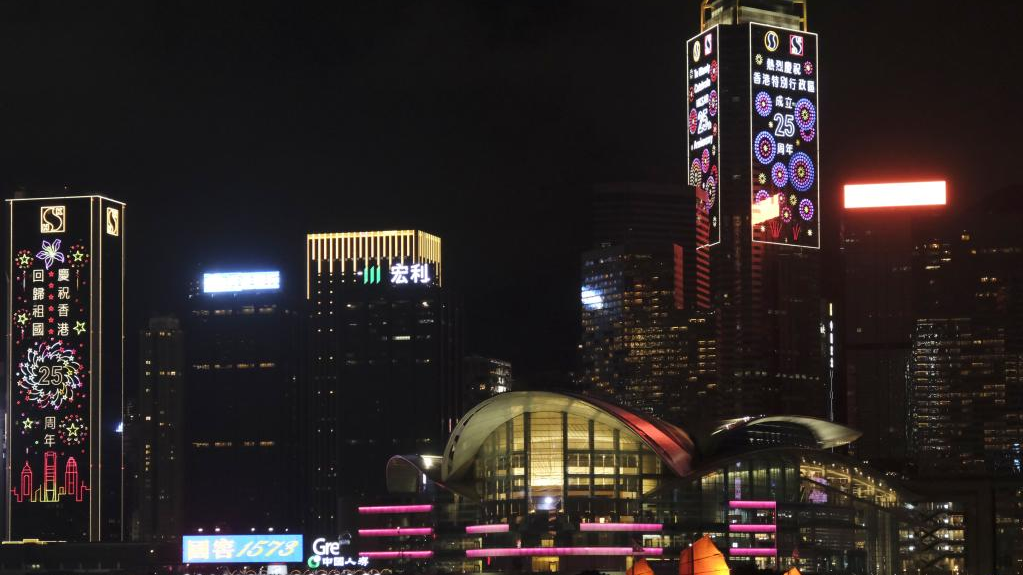
Editor's note: CGTN's First Voice provides instant commentary on breaking stories. The daily column clarifies emerging issues and better defines the news agenda, offering a Chinese perspective on the latest global events.
Chinese President Xi Jinping highly praised the role of the Hong Kong Special Administrative Region (HKSAR) in contributing to the country's economic miracle, and stressed the importance of implementing the "One Country, Two Systems" principle in a meeting celebrating the 25th anniversary of Hong Kong's return to the motherland on Friday.
"One Country, Two Systems" is a great and unprecedented initiative. Its underlying goal is to uphold China's national sovereignty, security, and development interests, and maintain long-term prosperity and stability in Hong Kong and Macao, President Xi said in his Friday speech, stressing the need to make sure that this initiative is fully applied in Hong Kong without being bent or distorted.
Since the central government resumed its sovereignty over Hong Kong on July 1, 1997, the city has retained renowned international status. According to the Global Financial Centres Index this March, Hong Kong is the top financial hub in Asia and ranks third worldwide. The city is the world's fifth most competitive place, according to the International Institute for Management Development. Hong Kong counts the largest pool of RMB liquidity in the world outside the Chinese mainland, amounting to over 800 billion RMB ($119.5 billion).
These achievements stem from the "One Country, Two Systems" principle, which is also the cornerstone of the city's economy. This principle gives Hong Kong a competitive edge with a robust financial system and a unique role as a bridge between the Chinese mainland and the rest of the world. In the meantime, it ensures that the motherland remains a source of strength for Hong Kong to overcome challenges and a reservoir of opportunities to break new ground in the city's development.
Within the "One Country" framework, Hong Kong exercises a high degree of autonomy in accordance with the provisions of the Basic Law. China's central government fulfilled its promise – "horses still run, stocks still sizzle, dancers still dance" – that late Chinese leader Deng Xiaoping made during the negotiations on Hong Kong's future with the UK in the 1980s. While there was no democracy in Hong Kong under British colonial rule, China's central government established democracy and has ensured that the city enjoys executive, legislative and independent judicial power.

Photo taken on June 25, 2022, shows buildings with light installations in Tsim Sha Tsui, south China's Hong Kong. /Xinhua
Photo taken on June 25, 2022, shows buildings with light installations in Tsim Sha Tsui, south China's Hong Kong. /Xinhua
However, these 25 years since the establishment of the SAR have not been plain sailing. Social unrest and violence in 2019 have inflicted heavy losses on Hong Kong people and the city as a whole. What is to blame is not "One Country, Two Systems," but the loopholes in the former electoral system.
This is why President Xi stressed on Friday the importance of ensuring both overall jurisdiction by the central authorities and a high degree of autonomy in the SAR. "Enforcing the central authorities' overall jurisdiction and upholding the SAR's high degree of autonomy are integral aspects of the same policy, and only by ensuring both can we run the SAR truly well," Xi said.
To plug the legal loopholes and ensure the smooth implementation of "One Country, Two Systems," the central government formulated and enforced the Hong Kong National Security Law as a national security safeguard; improved the election process for the selection of the Election Committee, the Chief Executive and the Legislative Council; and implemented the principle of "Patriots administering Hong Kong."
It is a natural requirement and international practice to keep the administrative power in the hands of patriots. As President Xi noted in his speech, "at no time should this principle be allowed to be compromised."
These measures are to protect – not harm, as some Westerners with ulterior motives hyped – "One Country, Two Systems" and thus democracy in Hong Kong.
Under "One Country, Two Systems," the central government has further unveiled plans including the Guangdong-Hong Kong-Macao Greater Bay Area (GBA) to tap the development potential of Hong Kong. According to a 2021 survey, the vast majority of Hong Kong residents acknowledged that the GBA would inject a new development momentum into the city.
In the past 25 years, the central government and the Hong Kong authority have turned crises into opportunities. Looking ahead, "One Country, Two Systems" is a principle that must be adhered to for not only the long-term well-being of Hong Kong and Macao, but the great rejuvenation of the Chinese nation as well.
(If you want to contribute and have specific expertise, please contact us at opinions@cgtn.com. Follow @thouse_opinions on Twitter to discover the latest commentaries in the CGTN Opinion Section.)

